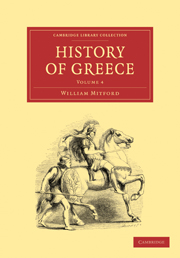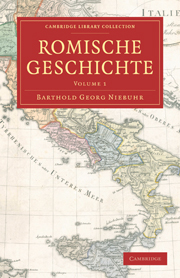Refine search
Actions for selected content:
23990 results in Ancient history

The History of Greece
-
- Published online:
- 12 April 2011
- Print publication:
- 31 October 2010
- First published in:
- 1808

Römische Geschichte
-
- Published online:
- 04 April 2011
- Print publication:
- 20 May 2010
- First published in:
- 1811
THEORISING WESTERN TIME: CONCEPTS AND MODELS
-
- Book:
- The Western Time of Ancient History
- Published online:
- 03 May 2011
- Print publication:
- 31 March 2011, pp 31-32
-
- Chapter
- Export citation
8 - Herodotus and Thucydides in the view of nineteenth-century German historians
- from ANCIENT HISTORY AND MODERN TEMPORALITIES
-
-
- Book:
- The Western Time of Ancient History
- Published online:
- 03 May 2011
- Print publication:
- 31 March 2011, pp 179-209
-
- Chapter
- Export citation
INTRODUCTION
-
- Book:
- The Western Time of Ancient History
- Published online:
- 03 May 2011
- Print publication:
- 31 March 2011, pp 1-2
-
- Chapter
- Export citation
12 - Repetition and exemplarity in historical thought: Ancient Rome and the ghosts of modernity
- from UNFOUNDING TIME IN AND THROUGH ANCIENT HISTORICAL THOUGHT
-
-
- Book:
- The Western Time of Ancient History
- Published online:
- 03 May 2011
- Print publication:
- 31 March 2011, pp 264-279
-
- Chapter
- Export citation
6 - Modern histories of ancient Greece: Genealogies, contexts and eighteenth-century narrative historiography
- from ANCIENT HISTORY AND MODERN TEMPORALITIES
-
-
- Book:
- The Western Time of Ancient History
- Published online:
- 03 May 2011
- Print publication:
- 31 March 2011, pp 138-155
-
- Chapter
- Export citation
Bibliography
-
- Book:
- The Western Time of Ancient History
- Published online:
- 03 May 2011
- Print publication:
- 31 March 2011, pp 315-349
-
- Chapter
- Export citation
3 - Greek philosophy and Western history: A philosophy-centred temporality
- from THEORISING WESTERN TIME: CONCEPTS AND MODELS
-
-
- Book:
- The Western Time of Ancient History
- Published online:
- 03 May 2011
- Print publication:
- 31 March 2011, pp 60-98
-
- Chapter
- Export citation
ANCIENT HISTORY AND MODERN TEMPORALITIES
-
- Book:
- The Western Time of Ancient History
- Published online:
- 03 May 2011
- Print publication:
- 31 March 2011, pp 117-118
-
- Chapter
- Export citation
13 - Time and authority in the Chronicle of Sulpicius Severus
- from UNFOUNDING TIME IN AND THROUGH ANCIENT HISTORICAL THOUGHT
-
-
- Book:
- The Western Time of Ancient History
- Published online:
- 03 May 2011
- Print publication:
- 31 March 2011, pp 280-298
-
- Chapter
- Export citation
15 - Seeing in and through time
- from AFTERWORD
-
-
- Book:
- The Western Time of Ancient History
- Published online:
- 03 May 2011
- Print publication:
- 31 March 2011, pp 307-314
-
- Chapter
- Export citation
Index
-
- Book:
- The Western Time of Ancient History
- Published online:
- 03 May 2011
- Print publication:
- 31 March 2011, pp 350-356
-
- Chapter
- Export citation
UNFOUNDING TIME IN AND THROUGH ANCIENT HISTORICAL THOUGHT
-
- Book:
- The Western Time of Ancient History
- Published online:
- 03 May 2011
- Print publication:
- 31 March 2011, pp 227-228
-
- Chapter
- Export citation
11 - Historia magistra vitae in Herodotus and Thucydides? The exemplary use of the past and ancient and modern temporalities
- from UNFOUNDING TIME IN AND THROUGH ANCIENT HISTORICAL THOUGHT
-
-
- Book:
- The Western Time of Ancient History
- Published online:
- 03 May 2011
- Print publication:
- 31 March 2011, pp 247-263
-
- Chapter
- Export citation
5 - The making of a bourgeois antiquity: Wilhelm von Humboldt and Greek history
- from ANCIENT HISTORY AND MODERN TEMPORALITIES
-
-
- Book:
- The Western Time of Ancient History
- Published online:
- 03 May 2011
- Print publication:
- 31 March 2011, pp 119-137
-
- Chapter
- Export citation
2 - Exemplarity and anti-exemplarity in early modern Europe
- from THEORISING WESTERN TIME: CONCEPTS AND MODELS
-
-
- Book:
- The Western Time of Ancient History
- Published online:
- 03 May 2011
- Print publication:
- 31 March 2011, pp 48-59
-
- Chapter
- Export citation
Acknowledgements
-
- Book:
- The Western Time of Ancient History
- Published online:
- 03 May 2011
- Print publication:
- 31 March 2011, pp viii-ix
-
- Chapter
- Export citation
9 - Monumentality and the meaning of the past in ancient and modern historiography
- from ANCIENT HISTORY AND MODERN TEMPORALITIES
-
-
- Book:
- The Western Time of Ancient History
- Published online:
- 03 May 2011
- Print publication:
- 31 March 2011, pp 210-226
-
- Chapter
- Export citation
AFTERWORD
-
- Book:
- The Western Time of Ancient History
- Published online:
- 03 May 2011
- Print publication:
- 31 March 2011, pp 299-300
-
- Chapter
- Export citation
